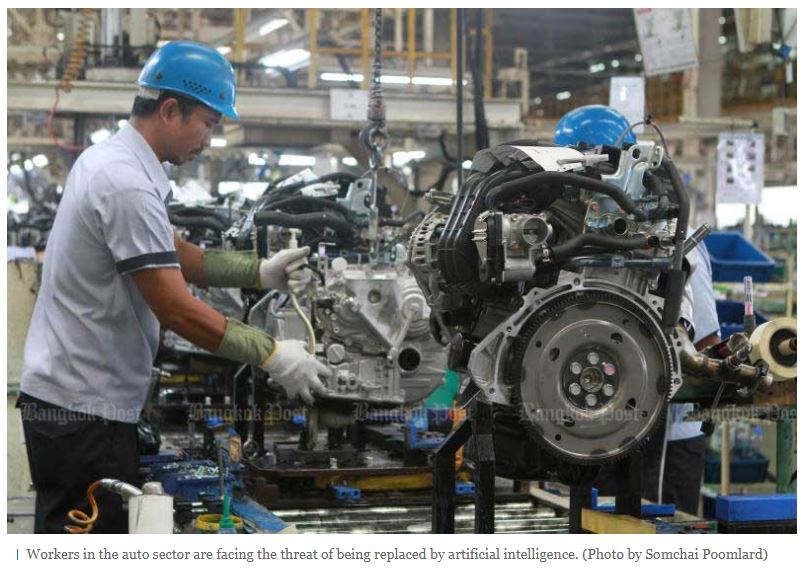Thailand: Auto workers miss out as AI gobbles up jobs
Workers in the auto sector are facing the threat of being replaced by artificial intelligence (AI) and having to demand special compensation allowed by the law if they are forced out of a job, according to labour leaders.
Hard hit by the Covid-19 pandemic, the sector which has seen vehicle exports to European countries and other lucrative markets tumble in recent months is seizing the opportunity to introduce AI in the assembly lines, said Winai Tintanode, chairman of the Federation of Thailand Automobile Workers Union.
He said 60% of vehicles produced in Thailand are exported. The pandemic has squeezed orders causing production to shrink by more than half since the beginning of the year.
From around 54,000 vehicles a month, production has slowed to 28,000 vehicles monthly. The number is forecast to contract even further to about 17,000 vehicles next month.
Mr Winai said there are reasons to believe the Covid-19 crisis is making auto manufacturers rethink their strategies and undertake a radical restructuring of production that will cost many factory workers their jobs.
More electric vehicles are being made in place of those running on petrol. The E-vehicles are composed of fewer parts, which renders some businesses in the supply chain irrelevant.
He said a pickup truck manufacturer has closed down its plant in Bang Na-Trat area of Samut Prakan and relocated to Laem Chabang industrial estate in Chon Buri where it now mainly produces electric vehicles using AI in the assembly process.
Robots make inroads
He said he has learned that thousands of AI robots have been shipped to Thailand and are now in a transit warehouse in Laem Chabang.
One robot can work in place of between five and 10 workers, Mr Winai said.
When exports of most vehicles are at a stand-still, the auto parts industry is also bearing the brunt.
Amornrit Saengyarak, chairman of the Thailand Auto Part Workers’ Union, said the industry was in bad shape late last year before Covid-19 struck. Many parts businesses triggered Section 75 of the labour law which permitted them to temporarily halt production although they need to keep paying their workers at least 75% of their wage.
However, in many cases, the employers paid well below the 75% requirement and told the workers to claim unemployment compensation from the Social Security Fund if they needed more money.
There are around 2,000 auto parts companies nationwide, employing at least half a million workers with a turnover amounting to 20 billion baht a year.
“The changeover to E-vehicle production is here and a vast number of jobs is under threat. We’re doing everything in our power to hold out for as long as possible,” Mr Amornrit said.
At a recent online seminar on workers’ rights in the dwindling auto parts sector, Sappanyu Namthaisong, head of the Thai Auto Product Workers Union of Thailand, said more auto product companies have imposed pay cuts on workers.
The workers are told to work four days a week with one off-day to be accepted without pay.
It is also common that sub-contracted firms supply workers to auto product companies. During downturns, the companies adopt cost-cutting measures including returning the workers to the subcontractors. The workers are then laid off, Mr Sappanyu said.
He added workers who still have jobs are barely making ends meet. Those who used to bring home 15,000 baht a month are now scraping through with only around 9,000 baht.
Mr Sappanyu urged the government to direct the companies to restore workers their full pay in exchange for giving the businesses tax incentives or reducing taxes for imports of machines.
Workers heading home
Mr Winai, meanwhile, said that as more companies embrace AI as a substitute for workers, the number of unemployed in the auto industry and related businesses could top 300,000 this year.
Those in their mid 40s and early 50s who have spent all their working lives employed in factories are among the first to be made redundant.
They have no skills and little prospect of finding new jobs.
Mr Winai said many older workers grew tired of routine factory jobs but stuck around for a steady income to feed their families.
The workers were earger to build up savings so they can one day return home to the provinces to farm and turn their back on factory life.
But for most workers, it is only a pipe dream.
They head home with little money as their low wages left them with no savings.
And when robots take away their employment, they are offered no compensation by the employer, let alone a special compensation stipulated by law.
Special compo a rarity
Labour union leaders said there are instances where employers who fire their workers ask to pay them severance pay in instalments, citing financial difficulty.
But in high-tech industries, laid-off workers are entitled to special compensation under the Labour Protection Act.
According to the Federation of Thailand Automobile Worker’s Union, Section 121 stipulates employers must pay special compensation on top of severance pay to workers whom they replace with machines, robots or new technological know-how.
The special compensation amounts to the workers’ last 15 working days worth of pay times the number of years in service although the workers must have been employed in the company for at least six consecutive years before being made redundant.
The federation said it has told auto companies that robot substitution falls under the labour protection law, which entitles laid-off workers to the special compensation.
“For the majority of the older workers, this portion of money will be their only source of financial security,” said Mr Winai.
“It means the world to them.
“They need this money to find their feet again.”
A labour expert said retrenchment may be unavoidable but that it is vital for all workers to be told about their labour rights.
Source: https://www.bangkokpost.com/business/1934800/auto-workers-miss-out-as-ai-gobbles-up-jobs


 English
English




